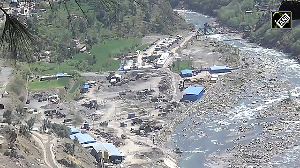With economic problems and job cuts, Hangzhou locals and people in other parts of China are not very pleased about hosting the Asian Games.

China hopes to make a splash with the Asian Games, opening on Saturday, but nationwide excitement has been muted as the economy sputters and some locals question the cost of the sporting extravaganza.
Delayed a year by COVID-19, the quadrennial games, kicking off in the eastern city of Hangzhou, will be China's biggest sporting event in over a decade, with more than 12,000 athletes from 45 nations competing in 40 sports.
Organisers this week expressed confidence in holding a "magnificent" games, thanks to President Xi Jinping’s "important instructions" and great, broad-based efforts. Analysts agree the event will likely go smoothly, given China's famously meticulous preparations.
Local officials will be aware that Xi previously worked in Hangzhou, is known to like big sporting events and will host a long list of leaders and other VIPs -- including Bashar al-Assad on only the second visit by a Syrian president to China since the countries established diplomatic ties in 1956.
But enthusiasm in Hangzhou and elsewhere in China is lacking, with some saying the new stadiums and other gleaming facilities reflect misplaced priorities.
"After three years of COVID, the economic and social atmosphere in China and the confidence are really low, and for Hangzhou these Asian Games are just a cash-burning project," said John Yan, founder of the Chinese media firm Score Sports and a leading football commentator in China.
"People care more about their own lives, and the Asian Games are not on the top of their list of concerns," Yan said. "People just don't care."
Organisers have not disclosed spending for the games, though the Hangzhou government has said it spent more than 200 billion yuan ($30 billion) in the five years through 2020 on transport infrastructure, stadiums, accommodation and other facilities.
"It would be better if this money were spent on the common people and on the youngsters," said Jiang, 69, a Hangzhou resident who asked to be identified only by her surname. "It's hard to find a job now. Some companies have closed down. It's really not easy for young people nowadays."
The expected flow of Chinese medals could lift the public mood around the games. Various issues marred the run-ups to Beijing Olympics in 2008 and 2022, but "when the sporting action kicks off, then the narrative very much changes," said Beijing-based commentator Mark Dreyer, author of a book on China’s sporting ambitions.

Still, in an indication of the subdued tone for the Asian Games, state media coverage until this week has been less comprehensive than before the 2022 Olympics - which were much smaller than these games and held under strict COVID restrictions.
It is easy to be unaware of the games, some Chinese social media users have written, unless you visit Hangzhou, where the slogans and other promotion are overwhelming.
The city in the wealthy province of Zhejiang near China's financial capital Shanghai, known for its picturesque lake, greenery and tea plantations, has been transformed in a huge spruce-up akin to Beijing's before the 2008 Olympics.
Hangzhou's streets wear bright colours to match games posters, pensioners have received English lessons and officials have adorned some older-looking or road-facing properties with flowers or other decorations.
"The impression I have is that over the past year, the entire city has been under construction," said 42-year-old city-centre resident Wu Lili, an e-commerce business owner.
"There's a saying online: 'The Hangzhou city government, when encountering even a dog, wishes they could catch it and give it a fresh coat of paint'."
Several residents said they were happy with the improved transport links and hoped for a boost to the local economy. Some saw the games as a welcome sign of opening up to the world amid concerns Xi's China was taking an inward, national security-focussed shift.
"Over the past few years due to the pandemic, our entertainment activities and mental wellbeing have been suppressed for a long time, so we need such events to boost our confidence," said a 24-year-old auto sector worker who asked to be identified only as Zhang.
Jules Boycoff, a scholar of the politics of sport at Pacific University in the US state of Oregon, said that for China's authorities, "it's about registering power at home, but it's also about putting your best foot forward to a global audience at a time when there's a lot of scepticism in the West toward China."
($1 = 7.2870 Chinese yuan renminbi)













 © 2025
© 2025